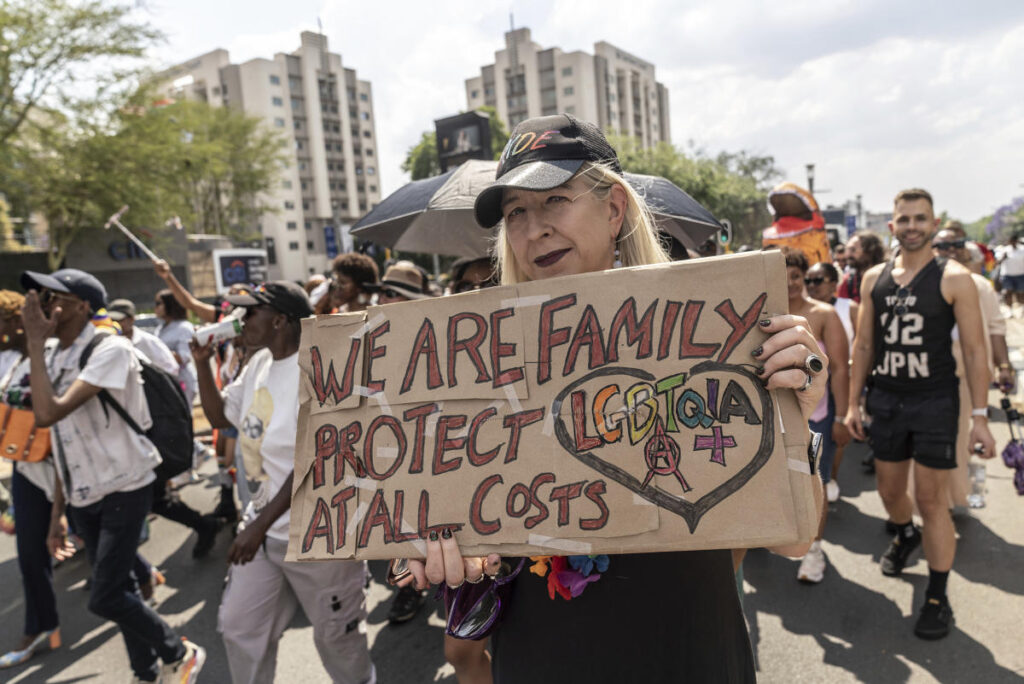On a vibrant Saturday morning, hundreds gathered in Johannesburg’s Sandton district to commemorate the 35th anniversary of Pride Johannesburg, an event that has played a pivotal role in advocating for the equal rights of the LGBTQ+ community in South Africa. The march, characterized by its colorful displays of diversity and unity, served not only as a celebration of LGBTQ+ identity but also as a poignant reminder of the ongoing struggles faced by many members of the community. Despite South Africa’s relatively progressive laws concerning equality and human rights, participants underscored the harsh realities of discrimination and violence that persist both domestically and across the African continent.
Among the participants, Johannesburg resident Alice Mpholo articulated the dual significance of the event. “Pride is really kind of reminiscent of just the rights and the opportunities that this community has fought so hard for,” she reflected, capturing the essence of the march as both a celebration and a call for awareness. Mpholo further noted that many African nations continue to actively suppress LGBTQ+ rights, with individuals facing persecution and even death for their identities. This stark contrast highlights not only the privileges enjoyed by some but also the critical need for solidarity and advocacy within broader struggles for human rights across the continent.
The atmosphere at the march was palpably joyous, yet tempered by a sense of urgency regarding the challenges that lie ahead for LGBTQ+ individuals, both in South Africa and beyond. Other attendees echoed Mpholo’s concerns, emphasizing the importance of raising awareness about the plight of LGBTQ+ communities in areas where their rights remain unrecognized. Events like Pride Johannesburg provide a platform to spotlight these issues and foster discussions about the necessity of continued activism. Participants took the opportunity to celebrate victories while acknowledging that the fight for full equality and acceptance is far from complete.
Bruce Conway, another participant in the march, emphasized the importance of community and self-acceptance in his comments. He described Pride as a safe space where individuals can unapologetically express their identities and embrace their uniqueness. “I’m here today to celebrate myself and other people who embrace their identity in radical ways and ways that we don’t normally appreciate on a day-to-day basis,” he stated. The march allowed individuals to experience love and support in a manner that may be hard to come by in their everyday lives, reinforcing the idea that such gatherings are not just political statements but also essential for emotional and communal well-being.
As the march progressed through the streets of Sandton, city traffic was redirected to accommodate the flow of participants, an illustration of both the event’s scale and its significance to the local community. The visible presence of law enforcement and community support further underscored the acceptance that is gradually growing, juxtaposed against the realities of violence and discrimination that many individuals still face. Such logistics reflect a changing societal landscape where pride, in this case, exemplified a gathering that promoted visibility, solidarity, and support for a historically marginalized group.
In conclusion, the 35th anniversary of Pride Johannesburg served as a crucial event not only celebrating the LGBTQ+ community’s achievements but also as a stark reminder of the ongoing battles they face both locally and internationally. It highlighted the need for continuous advocacy and drew attention to the challenges that many still endure, emphasizing the importance of awareness and activism. As attendees like Alice Mpholo and Bruce Conway illustrated, Pride is not merely a festival of color and joy but an impactful statement of resilience, community, and the unwavering spirit of those fighting for their rights. The march stood as a testament to how much has been achieved while reaffirming the work that remains in the quest for equality and acceptance for all.

